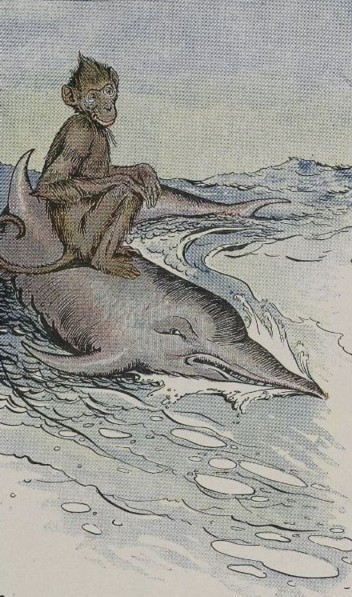PART A_1
Let’s learn vocabulary. Listen and repeat the words and the sentences with your tutor.
PART A_2
| 1. wreck | /rek/ |
| -to destroy or badly damage something | |
| The terrorists tried to wreck the capitol. | |
| 2. perish | /PER-ish/ |
| -to die, especially in an accident or by being killed, or to be destroyed | |
| Several people have perished in the strong typhoon. | |
| 3. voyage | /VOI-ij/ |
| -a long journey, especially by ship | |
| The pirates went on a voyage. | |
| 4. illustrious | /ih-LUHS-tree-uhs/ |
| -famous, well respected, and admired | |
| She is friends with several illustrious individuals. | |
| 5. noble | /NOH-buhl/ |
| -belonging to a high social rank in a society, especially by birth | |
| Kris came from a noble family. |
PART B_1
Let’s read the story. Please read them aloud, and I will check your pronunciation and intonation.
PART B_2
The Monkey and the Dolphin

It happened once upon a time that a certain Greek ship bound for Athens was wrecked off the coast close to Piraeus, the port of Athens. Had it not been for the Dolphins, who at that time were very friendly toward mankind and especially toward Athenians, all would have perished. But the Dolphins took the shipwrecked people on their backs and swam with them to shore.
Now it was the custom among the Greeks to take their pet monkeys and dogs with them whenever they went on a voyage. So when one of the Dolphins saw a Monkey struggling in the water, he thought it was a man, and made the Monkey climb up on his back. Then off he swam with him toward the shore.
The Monkey sat up, grave and dignified, on the Dolphin’s back.
“You are a citizen of illustrious Athens, are you not?” asked the Dolphin politely.
“Yes,” answered the Monkey, proudly. “My family is one of the noblest in the city.”
“Indeed,” said the Dolphin. “Then of course you often visit Piraeus.”
“Yes, yes,” replied the Monkey. “Indeed, I do. I am with him constantly. Piraeus is my very best friend.”
This answer took the Dolphin by surprise, and, turning his head, he now saw what it was he was carrying. Without more ado, he dived and left the foolish Monkey to take care of himself, while he swam off in search of some human being to save.
Now it was the custom among the Greeks to take their pet monkeys and dogs with them whenever they went on a voyage. So when one of the Dolphins saw a Monkey struggling in the water, he thought it was a man, and made the Monkey climb up on his back. Then off he swam with him toward the shore.
The Monkey sat up, grave and dignified, on the Dolphin’s back.
“You are a citizen of illustrious Athens, are you not?” asked the Dolphin politely.
“Yes,” answered the Monkey, proudly. “My family is one of the noblest in the city.”
“Indeed,” said the Dolphin. “Then of course you often visit Piraeus.”
“Yes, yes,” replied the Monkey. “Indeed, I do. I am with him constantly. Piraeus is my very best friend.”
This answer took the Dolphin by surprise, and, turning his head, he now saw what it was he was carrying. Without more ado, he dived and left the foolish Monkey to take care of himself, while he swam off in search of some human being to save.
One falsehood leads to another.
PART C_1
Let’s answer comprehension questions. Please answer them based on the story.
PART C_2
| 1. | What important role did the Dolphins play when the Greek ship was wrecked? |
| 2. | Why did it become a custom for the Greeks to bring their pet monkeys and dogs on voyages? |
| 3. | How did the Dolphin react after talking to the Monkey? |
PART D_1
Let’s discuss the story. Please answer the questions below and express your opinions.
PART D_2
| 1. | What would have happened if the Monkey did not lie to the Dolphin? |
| 2. | What custom that involves your pet/s do you practice in your country? |
| 3. | Is it possible to never lie? |
| 4. | What are some signs that a person is lying? |
| 5. | Do you agree with the fable’s moral? Why or why not? |
REVIEW AND FEEDBACK
Now, let us review the things that you learned in this lesson.
ではこのレッスンで学んだことを振り返りましょう。
(Please give a short feedback on how your student did on your class.)
| Grammar 文法 |
Pronunciation 発音 | Vocabulary 単語 |
Comprehension 理解 |
|
|---|---|---|---|---|
 GOOD GOOD |
文法の誤りはほとんどなく、完全な文章で話すことができる | ほとんどの単語をはっきりと正しく発音することができる | 習った表現を適切に使うことができる | 文章を理解し、質問に正しく答えることができる |
 FAIR |
文法の誤りはあるが、完全な文章で話すことができる | 発音の練習が必要な言葉がいくつかある | たまにミスはあるが、習った表現を適切に使うことができる | 文章を完全に理解するのは難しく、質問に正しく答えられないときもある |
 POOR |
文章で話すのは難しく、単語だけで話すことができる | 発音の練習が必要である | 習った単語と表現を少しだけ使うことができる | 文章を理解するのは難しく、質問に答えるのは難しい |
Parts of this lesson material are based on:
An eBook from The Project Gutenberg.
This eBook is for the use of anyone anywhere at no cost and with almost no restrictions whatsoever. You may copy it, give it away or re-use it under the terms of the Project Gutenberg License included with this eBook or online at www.gutenberg.org
An eBook from The Project Gutenberg.
This eBook is for the use of anyone anywhere at no cost and with almost no restrictions whatsoever. You may copy it, give it away or re-use it under the terms of the Project Gutenberg License included with this eBook or online at www.gutenberg.org